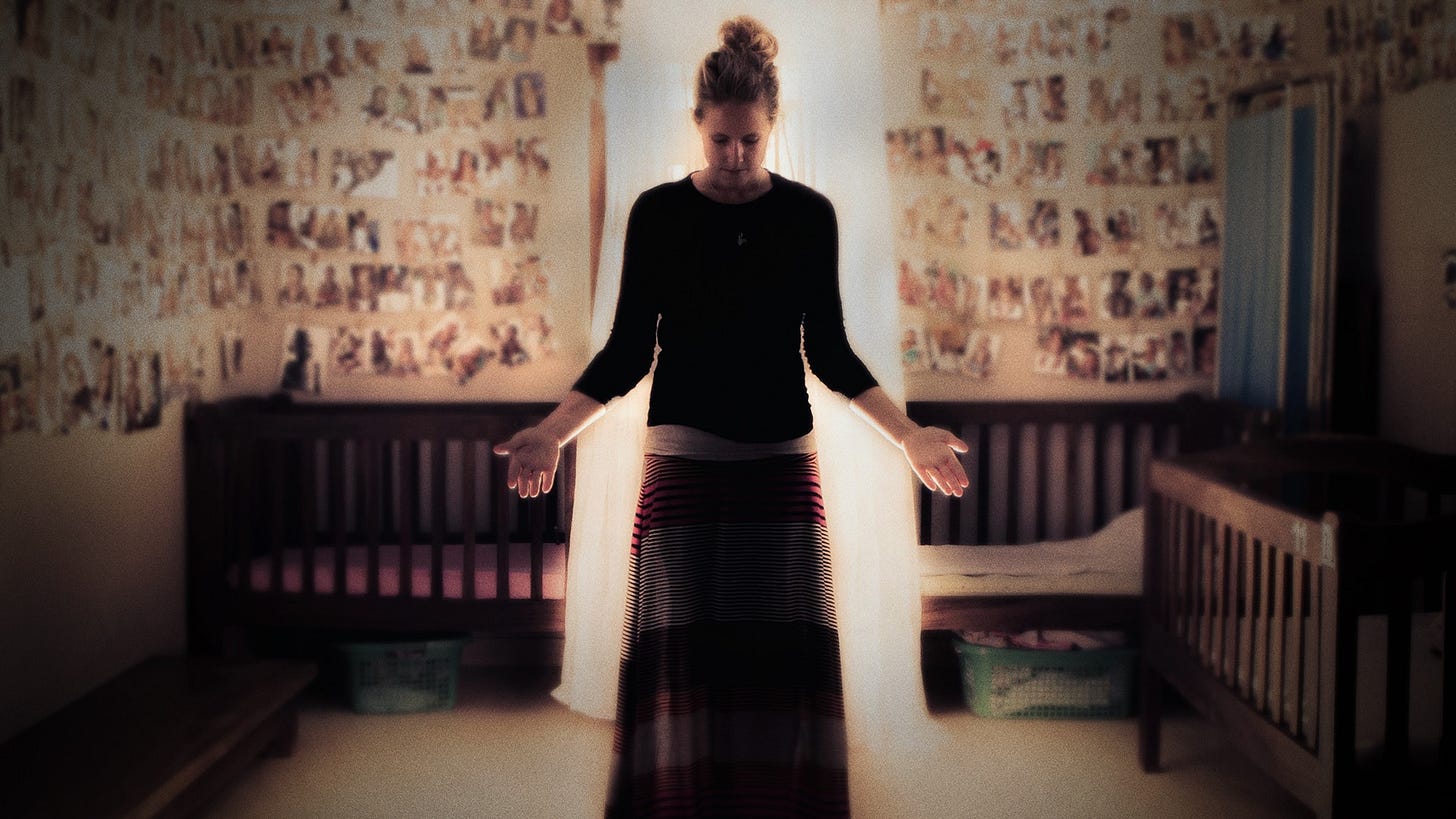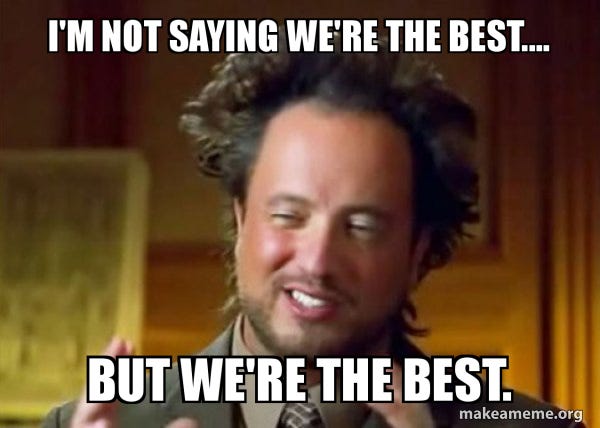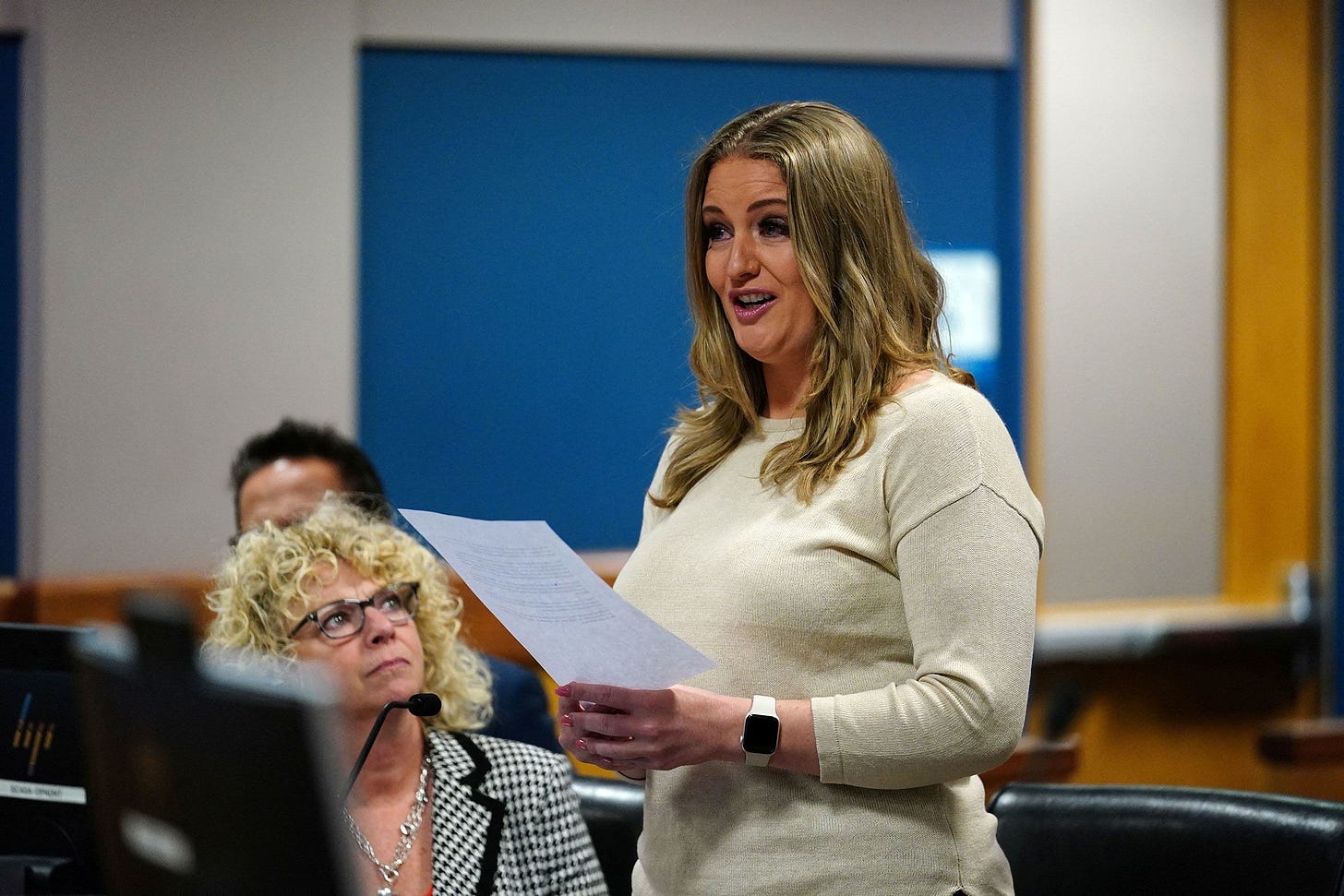The Savior Complex
Thoughts on "altruistic narcissism"
Did you hear my covert narcissism I disguise as altruism like some kind of congressman? (Tale as old as time)—Taylor Swift, “Anti-hero”
There are two kinds of people, people who feel guilty and people who feel screwed—My husband’s friend Dan, who is equally rock-star-like
I just watched the HBO documentary, The Savior Complex, about a young American woman, Renee Bach, who felt “called” to Uganda to serve as a missionary and ended up in way over her head running a medical facility treating malnourished children (the story was also covered in long form in the podcast, The Missionary). The wrinkle in this might-be inspiring tale is that Renee, who only finished high school, essentially ended up working as a physician, even at times overruling and opinions of trained nurses and doctors she had hired, administering medication, IV fluids, blood transfusions, and the like to incredibly ill children. Her center treated over 900 children, and about 100 of them died under her care, a mortality rate similar to nearby hospitals treating malnourishment. The center was eventually closed down by the Ugandan government for a lack of licensing, although she ended up continuing the work under government auspices for a time, before activists from the group No White Saviors (NWS) targeted her with civil action and a blistering PR campaign. She left Uganda in 2019 and hasn’t been back. The legal case was resolved with her paying a small settlement to two of the families whose children died.
Both the film and the podcast do a great job unspooling a nuanced, complex story with accounts from people on all sides. There is the young American nurse who followed her own “calling” to work at the center only to be horrified by Renee’s recklessness, prompting her to contact Ugandan authorities. There are the Ugandan medical personnel who worked with Renee at various points and generally took a more circumspect view of her work. They were at times alarmed and annoyed at Renee’s practices, especially her disregard for their expertise. But they also were clear-eyed about the realities of life in Uganda, where public hospitals are inundated and under-resourced (the public hospital often released or referred patients to Renee), good medical care is beyond the reach of most families, and child mortality is high. And, they were candid that they needed their jobs, and Renee signed their paychecks. There is Renee herself, and her allies, who believe wholeheartedly she only wished to serve others and fulfill a special calling from God and that the attack on her amounted to persecution.
Then there are the educated, middle-class Ugandan activists and their white American ally, hopped up on outrage and literature on neocolonialism, who (correctly) pointed out the privilege and free rein with which Westerners operate in Africa; the deference shown to them by ordinary people who associate whiteness with money, help, expertise, even moral authority; and the government officials who know the hundreds of millions of dollars the aid industry brings in helps keep the economy afloat. There is the Ugandan human rights attorney NWS hired to bring the lawsuit, whose prioritizing of facts and evidence, proper legal practice, and the wishes of the families involved proved disappointing to the activists, who operated in the realm of social media, where sensationalism, oversimplification, and exaggeration garner clicks and dollars.
And then there are the families of the children who were treated, some overjoyed, some heartbroken. Once word got out that a white lady could help their children, they flocked to Renee’s clinic. No one questioned her qualifications. All were grateful at the time. Few of those who lost children blamed her at all.
This is a world I know all too well, and I can see the multiple angles. I grew up in the privileged world of American missionaries and other do-gooders in Africa, who range from the admirable to the criminal, whose work can be characterized as life-saving or grifting, and who, at bottom, are flawed human beings who need strong accountability mechanisms like anybody else.
From my earliest age there, I perceived the deference—no, adulation—that greeted us white folks everywhere we went. It was upsetting to me as a child to have that kind of attention, more due to my own insecurities than an understanding of the power dynamics at play. I have seen smiling children run along side my car shouting “Mzungu” (white person), as seen in the film, countless times. I have seen humble churches welcome my family with gifts and front-row seats as if we were royalty. I have felt my hair gently stroked by awestruck children sitting in the row behind me. I have seen the President of Kenya visit my missionary school and hand out candy. I have seen Africans seek out my parents’ opinion and help on any number of issues and take their advice to heart in areas in which I found their wisdom lacking. From my experience, it’s hard to imagine an African ever reporting a Western missionary or aid worker to the police. It’s hard to imagine the police ever doing anything about it if they did. Even if the will were there, the capacity and competence of most African criminal justice systems make accountability difficult under the best of circumstances.
Of course, as the story indicates, that has changed somewhat in more recent years with the rise of an educated middle-class that is more self-assured and aware of history and the racial, economic, and geopolitical dimensions of Western philanthropy. There have now been a few cases brought against American missionaries/aid workers. For example, a Kenyan-American woman reported evidence she uncovered of widespread abuse at a missionary-run orphanage near her family’s home in Kenya, leading to the missionary’s conviction in the US. But mostly these cases are in US courts, which, since the passage of a 2003 law, can prosecute Americans for sex crimes and child abuse committed overseas. I’m told by survivors of mission field abuse and other advocates that this has been a sea change for accountability in missions, providing much needed impetus for most mission boards and schools to implement new policies and conduct internal reviews. However, for a variety of reasons, including the deference still shown to Americans in many developing countries, abusers will probably continue to evade the law more often than not.
But back to Renee. I don’t think she’s a murderer, as the activist community alleges. It’s difficult to discern how many of the children who died in her center would have survived given different care, as the mortality rate at her clinic was typical for acute malnutrition. And I don’t think all mission/aid work is “colonialism,” although there is no question that the colonial/imperialist mindset is embedded in the history and practice of missions. American evangelicals, who aren’t the best history students in general, are, in my opinion, inexcusably oblivious to it (at one point in the film, Renee stumbles over the word “neocolonialism” before admitting she doesn’t know what it means). Whether it’s the historical context of the Bible, church history, America’s racial past, or their own role in that—American evangelicals act as if history began when they arrived.
The story of missions in general is as complicated as this particular story. Missionaries, while they usually benefitted, and continue to benefit, from the protection of their governments and racial and economic privilege, also at times undermined the colonial enterprise and still create opportunity and provide needed services. Missionaries have built hospitals and schools and preserved indigenous languages and combatted human rights abuses, like Female Genital Mutilation. Africa’s nationalist leaders were all educated in missionary schools, where they received the skills and knowledge needed to take on Western governments. Opponents of Western aid writ large rightly argue that it has created dependency and allowed governments to avoid the responsibilities of good governance by relieving political pressure on them from their people. But it’s also true that if all the Western do-gooders left tomorrow, the economies of some countries would take a massive hit, and a great many ordinary people would suffer. And while the aid industrial complex is built on assumptions racial and economic superiority that need to be unraveled, the greater, more immediate enemy of ordinary Africans in 2023 is no longer colonial exploitation, it’s corrupt, authoritarian political leaders and the unstable political and economic systems they exploit and perpetuate.
But while Renee may not be a murderer, she is definitely a narcissist, of the kind that is so common in American evangelicalism and of which missionary work is at least in part an outgrowth. I read a fascinating book called How White Evangelicals Think by (Christian) psychologist Dave Verhaagen. He shares research indicating that the white American evangelical subculture as it currently exists attracts a higher than average number of people with Narcissistic Personality Disorder (NPD) and is imbued with what he terms “collective narcissism.”
Narcissists have an inflated sense of self that overcompensates for and masks a fear of introspection and an unconscious shame over weakness and failure. He finds that American culture in general is highly narcissistic (American exceptionalism, anyone?) but that white evangelicals add a theological layer that super charges a sense of importance and goodness. White evangelicals follow an exclusivist, highly confident theology rooted in an inerrantist view of scripture, the idea that the Bible is the unquestioned, literal authority on all matters and those who follow its correct interpretation (as defined by white evangelicals) are righteous and saved and everyone else is “lost.” American evangelicals are heavily, cosmically, existentially invested in being right, being special, and following a divine plan to save the world. They, of course, don’t see things that way. They whole-heartedly believe they are right, and if they don’t assert their rightness, if they don’t “share the love of Christ” with others, those folks will burn in hell for eternity. This is absolutely a sincere belief, I don’t think secular people fully grasp that. But a hallmark of narcissism is the inability to really see oneself, a lack of critical thought about one’s beliefs and behavior.
When confronted with failure or weakness, narcissists often go into a “rage,” demonizing the opponent and blaming others to avoid looking at self (see the culture wars). Sometimes the demonization is literal; I can’t count how many times I have heard evangelicals who are essentially suffering from the consequences of their actions, or just things not going their way, claim “Satanic attack.” Verhaagen sees evangelical participation in Trumpism as an example of a narcissistic rage response to a loss of cultural influence. In our friend Dan’s parlance, they are the screwed, not the guilty.
If you layer onto this rigid, highly certain theology and inflated sense of self the idea of “special calling,” ta-da, you get missionaries. American (and to a point, British) Christians pioneered this idea, and it’s so quintessentially American in it's energy, individualism, and peppy optimism. It’s not enough to bloom and serve where you are planted, that is too ordinary! God might have a “special plan” for you that involves dramatic action, great sacrifice, and great adventure.
And going to Africa as a missionary is pretty much the pinnacle of that (we won’t even get into the fact that Africa is at this point far more Christian than the US). No one in evangelicalism questions calling, even as they can’t quite pin down what it is. If you’ve been “called,” you must go and do, if you love God at all. And thus everything one does becomes spiritualized—ego, ambition, decision-making, tactics, relationships, consequences. Calling is king. The ends justify the means. I’m just out here trying to serve the Lord, goshdarnit.
And that’s how 19-year-old girls with no education end up playing doctor in Uganda, celebrated and massively funded all the way by her evangelical community, who get to feel special and righteous by association. Her one-time colleague talked about it being an “addiction” that she “couldn’t stop.” It feels really really good to be a spiritual super hero. You could even say it’s like a drug. And did she do some good? No question, she did. But the end point of narcissism is hard to control or predict. It doesn’t guarantee a harvest of death and destruction, but it certainly plows the fields.
Narcissism of any kind opens the door to abuse. Narcissistic group cultures attract abusers and give them a long leash. We’re seeing that very powerfully with America’s largest evangelical denomination, the Southern Baptist Convention. Which, by the way, also runs the largest missionary enterprise in the history of humanity.
This is getting long, so I’ll save the discussion of the evangelicalism-discomfort with race-mission nexus for another day. I’ll just raise the intense irony of sending missionaries to Africa while you are literally holding Africans as slaves or treating them that way after slavery’s end. Can we say overcompensation on steroids? Shame avoidance on a grand scale?
Last point for today—the film makes clear that Renee is a narcissist, but so are her most virulent opponents.
The activists also display narcissistic traits on behalf of their cause, the pursuit of which they also believe is above any scrutiny. They also show a complete inability to hold themselves accountable and look critically at their motivations and tactics. They demonstrate a willingness to lie, exaggerate, manipulate, and grift. They also believe a god of sorts (they are a secular enterprise) is on their side completely. They also demonize their opponent. They also oversimplify reality, ripping out nuance as if it were a faulty seam to fashion a garment of their design. And they eventually exhibit narcissistic rage upon losing Renee as a rallying point with the settlement of the case. They turn on the lawyer they hired and eventually each other.
And I must confess, I fell for their tactics. I didn’t send them any money (thankfully), but I did sign their petition seeking to prosecute Renee here in my state of Virginia, where she also now lives. There has been and will be no charges filed against her. I fell for it because NWS played into my biases. I have witnessed first hand the deep flaws and failures of evangelicalism and missions, and with age I have come to see them for the problematic systems they are. A person like Renee triggers a lot of frustration for me.
But the activists in this story are no better. And it’s a reminder to me, and should be a for anyone coming out of systems they now reject, to keep your wits about you. Don’t obliviously join a new narcissistic tribe. Don’t become the other side of the same coin.
No White Saviors’s slogan is “If you aren’t uncomfortable, you aren’t listening.” But what all of us tend to find the most uncomfortable is moral complexity and self-evaluation. It feels good to line up behind a righteous cause. It feels good to see a path clearly and to run down it full speed, confident and strong, arms pumping, cape flying.
The truth is too often found in small morsels that do not make a satisfying meal.









Thank you Holly for this post. I appreciate the inclusion of the binary of belief that appears on both sides. As the wife of a former short term missionary leader to Uganda, Kenya and Rwanda, I so appreciate your words. At the time, 30 years ago, we felt "the call". We were special. We were treated as such by our church. As a good Evangelical wife, I stayed home to manage our 5 children and support my husband doing "God's work". The attention we got in our church, the feeling of living in a fishbowl, the special allowances given our family, the fundraising etc, never sat right with me. Even back then, I felt uncomfortable with many aspects of the work, but didn't have the words. I just felt the dissonance in my body. I couldn't bring it to consciousness. Now I no longer identify as Evangelical. A lot has transpired in my personal life. My children are all adults. He's been away from the work for years. I no longer attend church. My husband still does. Needless to say it's been a long road. And with that, I feel such gratitude to be alive in this time of great uncovering and truth telling. I feel much clarity has come and will continue to unfold. We all have inner work to do, individually and collectively. Thanks again.
There is so much I didn’t know about the missionaries in Africa that I learned from reading this. The explanation of why American evangelicals adore Trump was invaluable. Thanks, Holly.